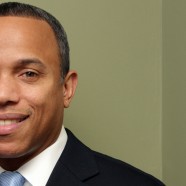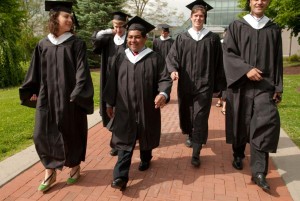
Growing up in Washington, D.C., son of a single father, Lamont Gordon ’87 attended seven different schools through eighth grade. Most of his family didn’t graduate from high school; no one had gone to college. When he discovered Milton through a summer enrichment program, boarding school was an unknown concept.
Buoyed by an admission brochure and encouragement from his father, Lamont applied and earned a full scholarship. Move-in day was the first time he set foot on Milton’s campus. “Milton was a great opportunity for me, but it was also my only opportunity,” he says. “I had no options at home. Milton changed the trajectory of my life.”
Today, Lamont is professionally dedicated to educational access and equity. He discovered the Posse Foundation while working at Brown, his alma mater, helping to scale up the university’s impact on public education. The Posse Foundation helps young people — many of whom would be overlooked by traditional admission processes — attend some of the country’s top colleges and universities. “I was impressed with the mission, the model and the outcomes,” he says. “The program was perfectly in line with my career interests and goals.”
Posse has partnerships with 51 top-tier colleges and universities, and places 10 students each year into each entering class of schools like Dartmouth, UVA, Boston University, Tulane, Cornell and Wesleyan. The name “Posse” refers to the linchpin of the program’s success.
“The name and the model developed from student feedback,” says Lamont. “Students need a network when they’re leaving their own communities and transitioning to these colleges and universities.”
Founder and president Deborah Bial earned a MacArthur “Genius Grant” for the overwhelming success of Posse’s cohort model and outstanding graduation rate. Founded in 1989, Posse has helped place more than 6,200 young people and maintains a graduation rate of 90 percent.
 Lamont began with Posse as director of the Boston office, which serves about 300 students each year from the city’s public schools. Eager to be part of the foundation’s strategic direction, he became an associate vice president in January 2014, based at the national headquarters in New York City.
Lamont began with Posse as director of the Boston office, which serves about 300 students each year from the city’s public schools. Eager to be part of the foundation’s strategic direction, he became an associate vice president in January 2014, based at the national headquarters in New York City.
Posse’s partner schools commit to admitting the selected cohort of students and providing a full scholarship for each student, over four years. Posse recruits the students, prepares them, and provides the support that helps them succeed.
The foundation works from nominations from the public school system and community-based organizations; students are accepted into the program in December of their senior year in high school. (In 2014, 700 students were admitted from a pool of 16,000 nominees.) Posse’s admission process pushes back on traditional admission criteria, which are dominated by SAT scores. “We’re not just looking for academically talented students, we’re looking for leaders,” says Lamont. “We’re looking for students who work well with a team, communicate well, are strategic thinkers, and who will bring those skills to campus and to the workforce. The best way for us to assess these qualities is to see them in action.”
The program achieves that observation and selection through their Dynamic Assessment Process (DAP). During the DAP, students problem solve during activities large and small, which allows them to showcase their qualitative skills. Evaluators walk around the room, observing, taking careful notes. After a second round of traditional interviews, students rank their top three school choices. By accepting a spot in a posse, students effectively enter into an early decision agreement.
Once admitted to the program, Posse Scholars participate in weekly workshops on team building, leadership development, cross-cultural communication, and academic awareness from January until August, preparing for the transition to campus. They anticipate and discuss the challenges ahead and figure out how to access resources.
“Posse is an asset-based organization,” says Lamont. “We focus on our students’ strengths. When students say, ‘I can’t do this,’ we say, ‘Yes you can.’ They may not be used to hearing that message, but they internalize it. Posse is a merit-based scholarship. Kids are here because they’re smart, driven, accomplished students with great potential and strong academic backgrounds, well prepared, and with every right to be there.
“We’re not simply a diversity program, but that’s part of what schools are looking for. They also partner with us because they know our scholars are going to graduate, and they’re looking for leaders who are going to be active, contributing members of their campuses.”
These days, Lamont is expanding several key initiatives from Posse’s recent strategic plan. Those include the foundation’s career and alumni programming, graduate and fellowship opportunities, and the new veterans initiative.
“Posse Scholars graduate and become leaders in the workforce, so we want to help them think about long-term goals as soon as they enter the program,” says Lamont. “Our model is based on partnering with undergraduate institutions, but we have affiliations with some top graduate programs as well. We want to create a culture where students know about fellowship opportunities and they know they have access to them. We learned that 40 percent of Posse alumni were pursuing or had earned graduate degrees two years after college, but many were not going to top-tier programs. We want to help students see themselves as eligible and then help position them well.”
Posse’s Veterans Program leverages the cohort model to serve post-9/11 military veterans looking to earn bachelor’s degrees at top schools. Vassar was the first school to admit a Veterans Posse; Wesleyan was next, and Dartmouth committed in 2014. Posse is applying its cohort model — which has been successful with younger students for 25 years — to a new population with very different needs. Lamont oversees a team that is working to help build a strong nomination network, and gain a foothold in veterans’ community programs and the military’s transition services. They are thinking through what a “posse” means for 20- and 30-year-olds, some with families of their own.
Posse operates in nine cities across the country and is opening its tenth site in San Francisco this year. Not only is Posse changing life opportunities for students, but it’s also stimulating changes in the way colleges approach evaluating students for success. “The program is not just about college access and graduating — it’s about looking at the people running this country, and wanting to make sure those decision makers represent the diversity of the United States. When a 12th grader steps into that room, we want to be able to determine whether she might one day be running Citibank, spearheading medical research, or starting a nonprofit. If so, we want to help her get there.”
by Erin Berg



